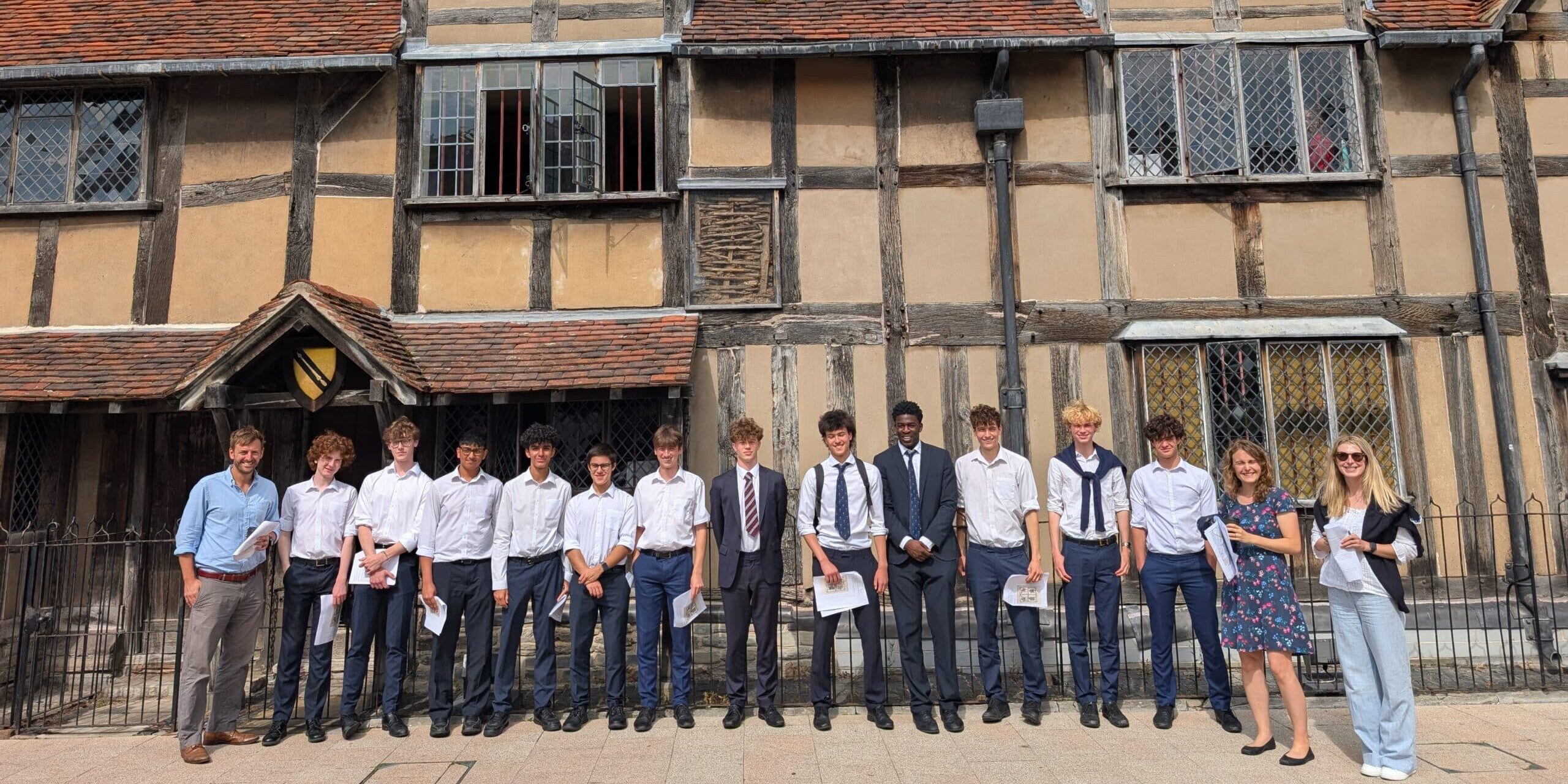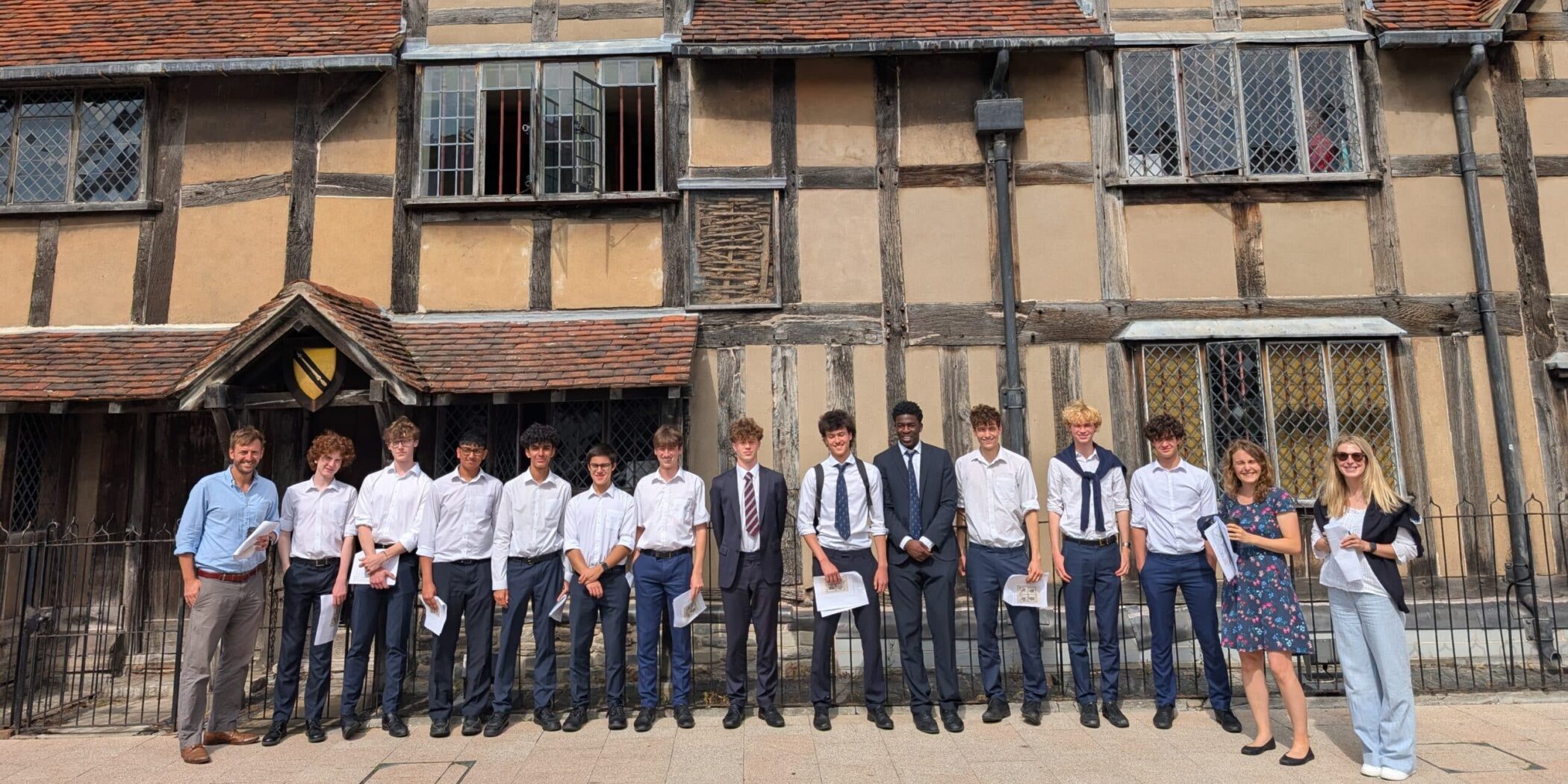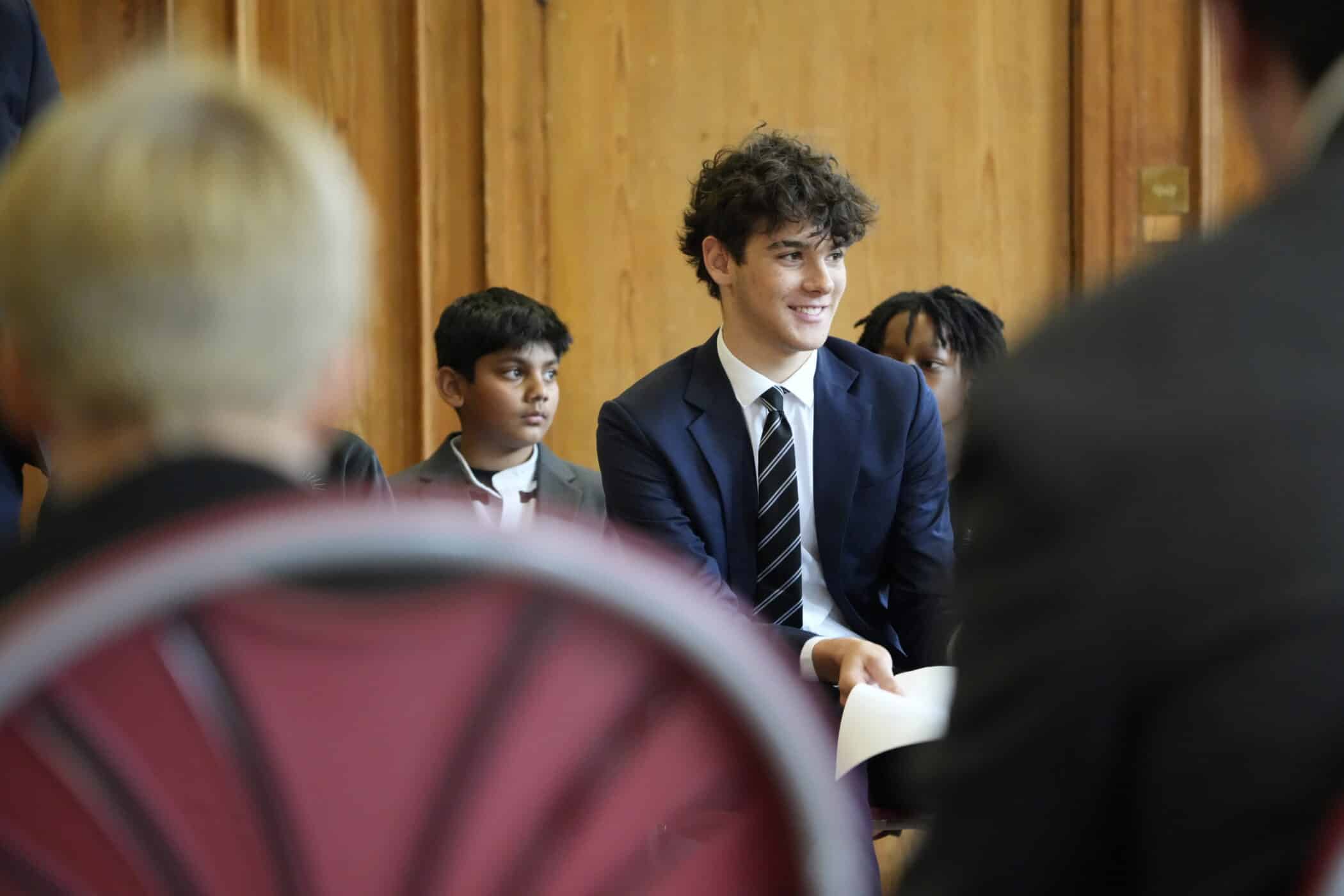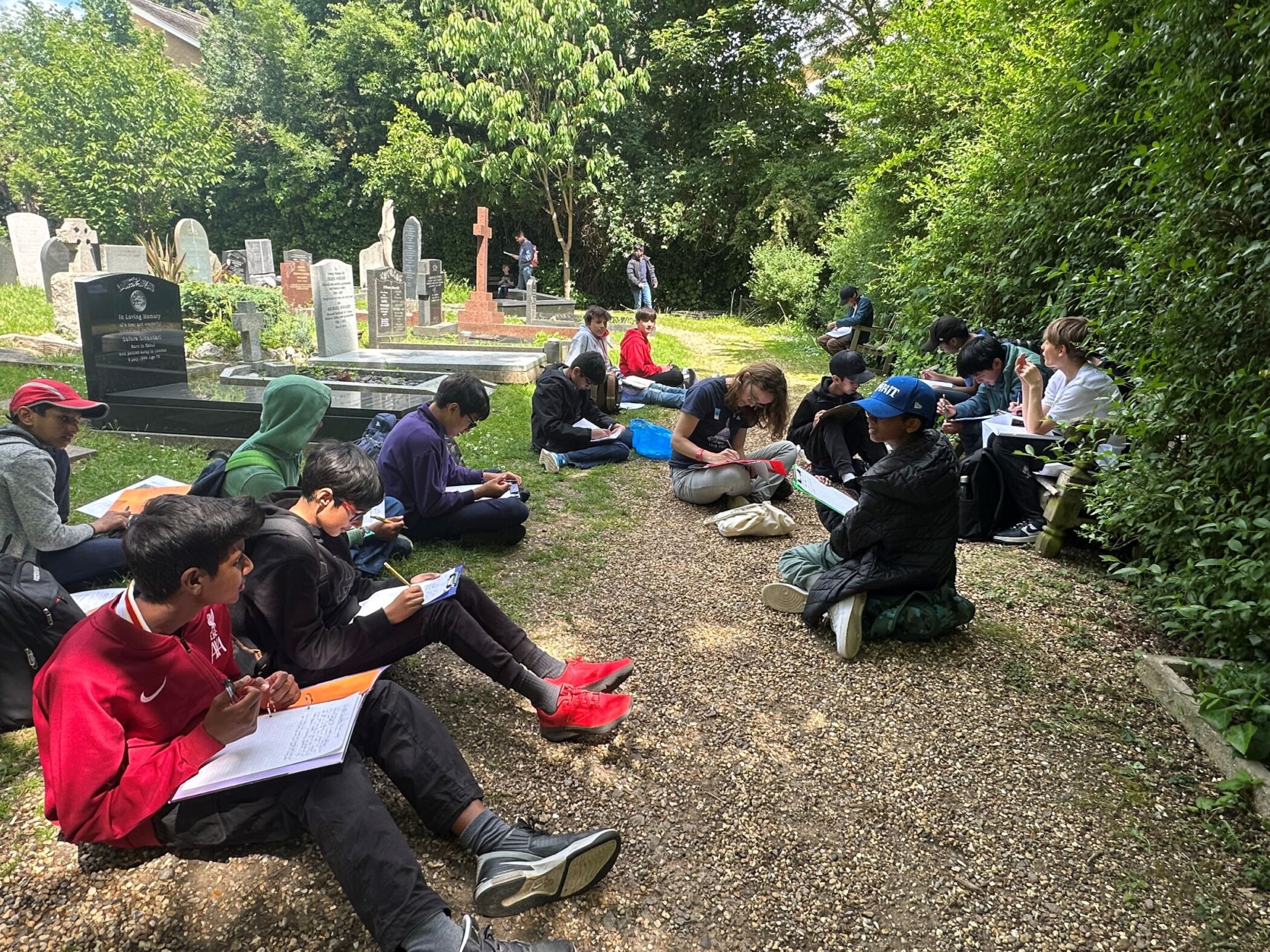Last Thursday, a group of A-level English students and teachers made the pilgrimage to Stratford-Upon-Avon to witness Hamlet: Hail to the Thief, an RSC x Radiohead production featuring music from the band’s sixth album, modified for the play by frontman Thom Yorke, and with enough jackets suspended hauntingly above the stage to clothe a small army.
Edward G. (L6th, English Literature
Amongst the bard-related tourist traps – ‘Shakespeare Coffee’, ‘Othello Taxis’ and unfortunately-named Ophelia ferry – you could have cut the tension with a poisoned rapier. It was the official Press Night, after all, and the performance, we had been warned, would be “like being thrown down a staircase”.
“Look out for a jump-scare”, Christine Jones cautioned us beforehand; such was the sustained pulsating intensity of the performance.
For an hour and a half, Samuel Blenkin (a volatile, Tennant-esque Hamlet), Ami Tredrea (Ophelia – ‘resolutely a woman of action’), Paul Hilton (Claudius: guilty, greasy, twitchy) and Claudia Harrison (disloyal and abhorrent as Gertrude) pranced, cavorted and headbanged upon the stage of the Royal Shakespeare Theatre in one of the most enthralling and original performances of the play since its conception. Producers Steven Hoggett and Christine Jones channelled their inner ‘90s Radiohead in cutting against the conventional grain, halving the runtime, fashioning an Ophelia bold enough to strike her maddened lover, and transforming the final duelling scene into a snarling, bloody, tribalistic wresting match far removed from Hamlet and Laertes’ traditional fencing contest.
The performance was thoroughly enjoyed across the board, receiving a standing ovation from a star-studded crowd: Thom Yorke, David Bradley, and several young men resembling Timothée Chalamet were spotted among the glamorous afterparty. Our journey home was spent deliberating the recurrent jacket-related imagery and lamenting the negligence of Laertes’ resolution. Much can be forgiven, however, in the name of artistic license, which was heavily exercised in the production.
We students extend our deepest thanks to all those who made the outing possible: Mr Hilton-Dennis, who organised the trip and tickets; Christina Jones, who welcomed us to the production; the other members staff who helped the day run smoothly and enjoyably, organising a tour of Shakespeare’s hometown, pointing out celebrities, and appeasing us with chips!
David A.
(L6th, English Literature)
It seems fitting that one of the shortest productions of Hamlet in memory (aided by an alternative rock sound score) encapsulated the ‘live fast, die faster’ mentality of the rock music it so effortlessly incorporated into the ‘unalterable Shakespearean classic’ Hamlet.
This is an ode to the ever-evolving power of theatre and the storytelling that music (when played by a band of masterful musicians and balanced to perfection) can do. There is not enough concision that would allow me to give credit to the extraordinary choreography that presented a Hamlet with the same interpretive quality as the ‘dumb show’ scene.
Hamlet showed his face within the first 5 minutes of the play’s starting, cutting the first scene to the point of rushing. Though his appearance is swift it is evident that the lead band member of the court scene is Claudius, whom I suspect is guilty (along with the other leading cast) of having watched a few biographical dramas like ‘Rocketman’ to inspire his ‘rockstar with problems’ persona. His costume designer seems to have taken a look at Mick Fleetwood’s closet (for those who don’t know Mick got very famous and had a lot of fun doing so, drugs having been a staple in many rockstars diets). He also donned the symbolic cigarette to signify he had bad habits and was thus, evidently evil.
Samuel Blenkin got the memo on acting any replayed character in theatre: make it different, do it fresh. It was an experience of feeling the words were less practiced poetry and more spontaneous emotion. There is a power in feeling confident enough in a role to take the time between some incredibly famous and serious monologues to act a bit cheekily, to switch to overconfident snarky teenager mode. What made this easier for him could have been the shorter runtime and the pressure to fit a snapshot of the overthinking, witty, bipolar, damaged boy within it.
There were times when the fast paced, electric atmosphere fell off the edge and into the chasm of ineffective rushing. Some lines lost meaning in the Rapper-Esque pace they were performed and the final duel bordered on chaotic (no, not the good kind) and lost the variety in meaning that different interpretations explored more clearly. The closing ‘duel’ diverged more from the text in its brutality and violence than even Branagh’s film version, which involved chasing around a palace and throwing someone off a balcony.
There is a degree to which you could take a purist’s view on Hamlet and say that this besmirches the subtle genius of Shakespeare, but the genius of this Hamlet lies in the idea conceived: to mix music with theatre (which Shakespeare would likely have approved of and applauded, depending on what he would have thought about Radiohead.) Not only music but lighting, sound and staging electrified the ‘Ghost’, coming closest (at least for me) to recreating the Ghost I imagine; not a man in rags but a voice, a cinematic spirit that literally exudes crackling energy (hey, maybe I’ve seen to many fantasy films, but it just feels right to me).
In fitting with the alt-rock grounded musical performance, the whole cast gained a layer of grit. Ophelia in particular broke some seriously ingrained perceptions and went so far as to slap the Dane himself (God knows, he kind of deserves it). I feel the director possibly overlooked the rule of leaving a good thing alone and though the intentions behind ‘To be or not to be’ (the reprise) were thought out, it didn’t carry the same weight in the encore. Rosencrantz and Guildenstern were more outspoken against Hamlet (with Rosencrantz seeming to be flirting with the Queen at a few points – or at least I thought so. I’m happy to be wrong on that one). Horatio watched as her friend dug further into his own tragic hole, not just playing the reliable ‘I’ll always be on your side’ guy, but the ‘please stop digging now’ friend we all need. Gertrude was a mystery, insofar as I got no sense of what motivation she had.
The irrefutable success of ‘Hamlet: Hail to the Thief’ lies in Radiohead’s music and the utilisation thereof, as well as choreography that was as effective in giving old scenes and lines new meaning as any other Hamlet I’ve seen. The genius doesn’t stop there either. If you enjoy Thom York’s dulcet tones, the singers had done their research – they knew how to create the Yorke vibe.
To summarise, I haven’t said as much as I want to about the play and wouldn’t be able to with twice the space I’ve used. When this is the case, it is a play worth seeing yourself. You will remember it.









